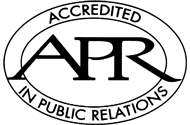Many professionals have credentials or letters after their name, but what do they mean? Do they even matter? This week’s blog post is going to discuss one such situation – the APR.
 APR means Accredited in Public Relations. For members of FPRA, PRSA, and other professional public relations organizations, you probably understand the significance. It’s an earned designation that is received after completing a peer-hosted readiness review (or case study presentation) and passing an in-depth exam. It sets the recipient apart as someone not only skilled in the field of public relations, but also in leadership, financial responsibility, and management.
APR means Accredited in Public Relations. For members of FPRA, PRSA, and other professional public relations organizations, you probably understand the significance. It’s an earned designation that is received after completing a peer-hosted readiness review (or case study presentation) and passing an in-depth exam. It sets the recipient apart as someone not only skilled in the field of public relations, but also in leadership, financial responsibility, and management.
As the owner of a public relations firm, I’ve done proposals for many companies over the years and met with many business owners who were looking for assistance in communications. Price, team size, location, and experience in the industry or location are all areas of interest. What the potential client really wants to know is how well you, the agency or public relations professional, can do the task at hand. Having someone on the team, or better yet, the leader, with their APR offers a leg up – but only if the potential client understands what it means.
Coordinated by the Universal Accreditation Board (UAB), “APR is a mark of distinction for public relations professionals who demonstrate their commitment to the profession and to its ethical practice, and who are selected based on broad knowledge, strategic perspective, and sound professional judgment.”
Its fundamental purpose is to unify and advance the profession by identifying those who have demonstrated broad knowledge, experience, and professional judgment in the field.
The APR exam draws its questions from all areas of the public relations body of knowledge, including:
- Research, planning, implementing, and evaluating programs
- Ethics and law
- Communications models and theories
- Business literacy
- Management skills and issues
- Crisis communications management
- Media relations
- Using Information Technology efficiently
- History of and current issues in public relations
- Advanced communications skills
As you can see, it’s a powerful way to measure a public relations professional’s skill set and knowledge base. I am proud to say that I have my APR because it proves my level of knowledge and experience. My work is a testament to that and now I have credentials that are as well. I am thankful to my local FPRA chapter for their support and guidance as well. This process would have been significantly harder without them.
For more information on how you can become accredited, visit the UAB website or talk to the credentialing chair at a local FPRA chapter.
